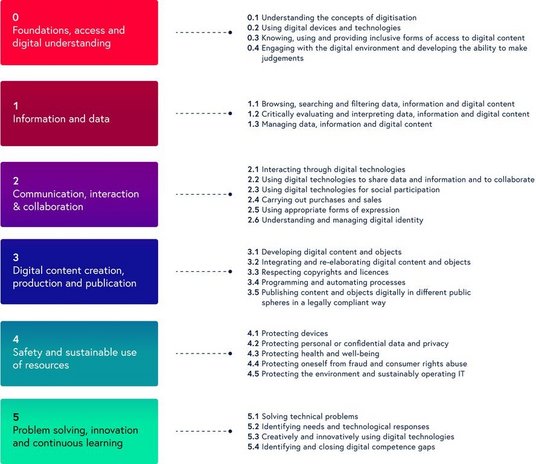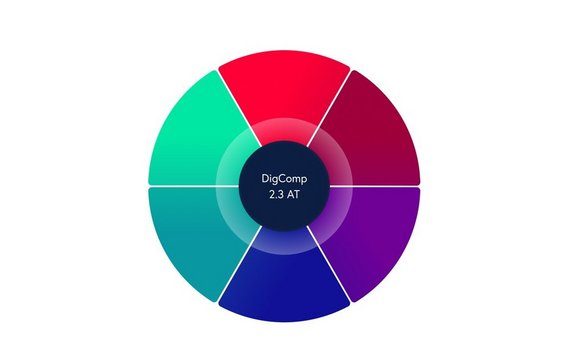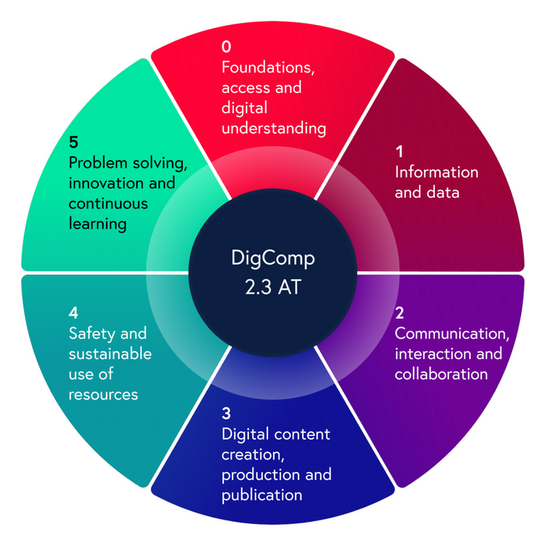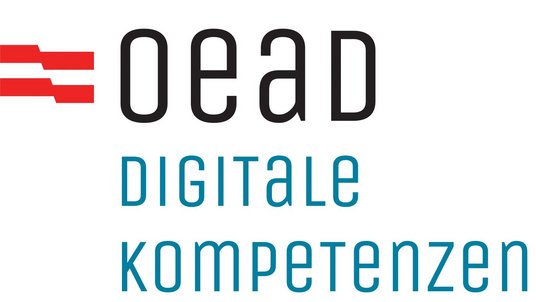

DigComp 2.3 AT
Austrian Digital Competence Framework
"Digital competence involves the confident and critical use of Information Society Technology for work, leisure and communication."
From the recommendation of the European Parliament and the Council of 18 December 2006 on key competences for lifelong learning
Digital skills are one of the eight key skills for lifelong learning of the European Union. Since 2013 the European DigComp framework has been in use, which describes key components of digital competence and is now in use across the EU in the DigComp 2.2 version.
The Austrian Digital Competence Framework is based on the European model and constitutes the core of the National Framework of Reference for Digital Competence.
Keep reading for an overview of the current version DigComp 2.3 AT or download the English version here!

Competence areas
The Austrian competence framework provides an overview of digital skills necessary for everyday life and the workplace. It is divided into competence areas that align with those of the EU model. However, the Austrian framework has been supplemented with an additional competence area: 0. Foundations, Access and Digital Understanding. This area includes competences necessary for understanding and navigating digital environments. The other five competence areas, which are identical to the EU model, feature some additional specific competences in the Austrian version, such as "Carrying out purchases and sales." Below is an overview of the competence areas and their corresponding specific competences.
Competence area 0 focuses on a basic understanding for digital technologies as well as their application and operation. It includes the knowledge and application as well as the provision of tools and structures for digital accessibility. Competence area 0 also includes an understanding of the difference between analogue and digital and of dealing with the digital environment.
Competence area 1 includes articulation and fulfilment of information needs, browsing, filtering, storing and managing data, information and digital content. It also includes the critical assessment of data sources, analysis of the data as well as data organisation and processing.
Competence area 2 relates to communication and collaboration with the help of digital technologies, using appropriate forms of expression and taking account of diversity aspects. It includes active and participatory involvement in society and the economy as well as tools and services for collaborative processes. Competence area 2 also includes shaping the digital presence, identity and reputation of an individual.
Competence area 3 comprises the ability to use digital media and tools creatively to create and edit content and publish this in various (digital) public environments. This includes understanding and complying with copyrights, rights of use and licences. Further elements of the competence area include programming as well as process automation.
Competence area 4 relates to the safety risks associated with the digital environment. This specifically involves the protection of devices, content, personal data and privacy from threats, misuse or fraud. Maintaining physical and mental well-being as well as support options through the use of digital technologies are also included, along with active structuring of the environmental impact of digital technologies and their use.
Competence area 5 involves identifying, analysing and solving technical problems, as well as the ability to use digital tools and strategies creatively for specific requirements or in order to create knowledge and innovation for projects and processes. The area also includes identifying and closing gaps in the individual’s own competences and engaging with digital developments on a continuous basis.
Competences
Below you find a list of all 27 competences, grouped into 6 competence areas.

Proficiency Levels
The DigComp framework describes digital competences not only at the content level but also across eight different proficiency levels, ranging from basic to highly specialised.

In addition to the six competence areas, the framework describes the development and characteristics of digital competences over a total of eight levels. This level structure means that the Austrian Framework of Reference for Digital Competence corresponds with the European Qualifications Framework (EQF), which also has eight levels, and the Austrian National Qualifications Framework (NQF), which is likewise aligned with the EQF.

Expand the individual sections to get a detailed description of the proficiency levels.
Level 1 - Foundation: elementary
A person has elementary basic knowledge and basic skills and is able to fulfil initial simple tasks with direct instruction.
Level 2 – Foundation: solid
A person has solid basic knowledge as well as fundamental practical skills and is able to carry out simple tasks with a certain degree of independence following instruction.
Level 3 – Intermediate: well-founded
A person has well-founded knowledge, methods and tools, masters tasks independently and adapts their own behaviour in the course of solving problems.
Level 4 – Intermediate: in-depth
A person has in-depth theoretical and factual knowledge as well as practical skills in solving specific problems. They are able to work independently and supervise others’ routine work.
Level 5 – Advanced: comprehensive
A person has comprehensive advanced knowledge that is accompanied by greater responsibility (e.g. team leadership). The person is able to pass on the digital competence that they have acquired to others in a structured manner and to manage and supervise work or learning contexts.
Level 6 – Advanced: in-depth
A person has in-depth, advanced knowledge and skills in the specialised area of application, is able to overcome comprehensive challenges in changing contexts and manage complex projects and (business) areas.
Level 7 – Highly specialised: strategic
An individual has highly specialised knowledge based directly on the latest findings, has competences that enable new solutions to be achieved for the professional community (e.g. leading an innovation project) and leads complex and unpredictable work or learning contexts that require new strategic approaches.
Level 8 – Highly specialised: innovative
A person has state-of-the-art knowledge, professional authority and capacities for innovation. They are able to generate new knowledge to contribute to the advancement of their field of work or study, including research.



